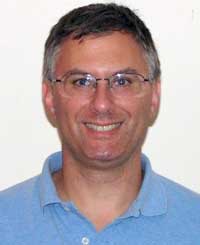Steve Rosenblum
 Biography
BiographyRosenblum received his Applied Physics PhD from the University of Michigan, Ann Arbor in 1997. Since graduating, his work has focused on taking ideas and techniques from research and propagating them to a broader audience – first with Kaiser Optical Systems, and since 1999 with Corning Incorporated. At Kaiser he collaborated with Fortune 500 chemical and electronics companies to deploy turn-key analyzers utilizing Raman spectroscopy. At Corning he spent eight years developing models for characterizing optical waveguide attributes and manufacturing processes. In early 2007 he moved to business development role, and finds new markets for Corning Incorporated's technology portfolio.
Rosenblum holds five patents and a similar number of journal publications.
StatementRepresenting less than 200 ppm of the US population, we physicists can increase our impact if we shift how we think about our work from being symbiotic to being catalytic. Rather than merely repaying the resources society and industry provide with our own aperiodic inventions and discoveries, our small numbers require that we drive technologies and breakthroughs beyond our disciplines and institutions if we are to continue having the disproportionate impact on society we had in the 20th century. I view FIAP as the vessel by which we can enable this shift.
Metaphors make for good rhetoric, but do not form a plan. Anecdotal data from my own experience and that of my peers at other companies indicate two obstacles that greatly hinder us from interacting more strongly within the greater industrial world:
1. draconian terms and conditions required by universities for collaborations
2. unreasonable fear of IP leakage on the part of corporations
My goal as Member At Large will be to use our Society as a means of facilitating relationships between institutions. I want to listen to other members' experiences and find a set of common needs for the APS and FIAP to fill. Whether we learn that FIAP's best course lies in sponsoring the development of standard collaboration contracts or in lobbying congress for changes in intellectual property law, the APS's neutrality makes it an ideal organization for leading this work.
